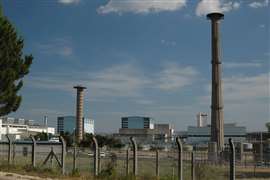Vinci and Bouygues among six firms fined €31m for bid rigging in nuclear work
08 September 2023
 The Marcoule nuclear site in the Gard region of France (Image: Paul Gipe, CC BY-SA 4.0, via Wikimedia Commons)
The Marcoule nuclear site in the Gard region of France (Image: Paul Gipe, CC BY-SA 4.0, via Wikimedia Commons)
France’s competition watchdog, Autorité de la Concurrence, has fined six companies a total of €31 million for bid rigging relating to tenders for work at a nuclear site in the country.
Nuvia Process (a subsidiary of Vinci Group), ENDEL (formerly and Engie subsidiary), Bouygues Construction Expertises (BCEN), SNEF and SPIE Nucléaire are all subject to the penalties.
The Autorité granted a sixth company, ONET Group, leniency and it has received an exemption from financial penalties.
The fines come after dawn raids at the companies prompted by suspicions of anticompetitive practices when it came to tendering for work at the French Alternative Energies and Atomic Energy Commission’s (CEA) Marcoule nuclear site in the Gard region.
ONET Group applied for leniency in the case and provided information for the investigation.
The Autorité accused ONET’s subsidiary OTND, Nuvia Process, ENDEL, BCEN, SNEF and SPIE Nucléaire of exchanging commercially sensitive information with a view to responding to certain calls for tender organised by the CEA for decommissioning of different installations in Marcoule.
It said that the motive behind sharing the information was to agree on price levels to be offered to the client and share out the contracts.
The CEA launched a call for tender in January 2015 with a view to concluding a framework agreement with several companies for an initial period of three years.
But it was found that prior to the submission of tenders, three companies awarded spots on the framework (OTND, ENDEL and Nuvia) had met and exchanged information, notably concerning price lists to be submitted in response to the call for tender.
Subsequently, during the implementation of the framework agreement, BCEN, which was also awarded a place on the framework, took part in the anticompetitive practices implement by the three other companies.
Each of the four winning companies talked to competitors before bidding for the various contracts.
The Autorité found that companies had broken down the different contracts between them, with precise monitoring of allocations.
Companies wanting to win the bid provided competitors with a price breakdown table, enabling the other companies to draw up cover bids.
Personal emails used
The watchdog said that the participants exchanged information regularly using email, text messages and physical meetings. Some participants also used personal email addresses or those of other family members.
The Autorité also noted that exchanges between decommissioning service providers also took place for nine other ad hoc calls for tender, which did not fall within the scope of the framework agreement.
In a statement, the Autorité said, “These practices are among the most serious breaches of competition rules, as they aim to remove the advantages that consumers and the public entity are entitled to expect from a competitive economy, and instead benefit the perpetrators.
“Disrupting the normal course of tendering procedures by hindering the free market pricing process and misleading the public authority as to the reality and extent of competition between tenderers, is detrimental to the sector in which such practices take place, and constitutes a serious breach of economic public policy.”
Nuvia’s penalty amounted to €13.9 million, while Endel received a fine of €11 million and BCEN a fine of €6.2 million.
SNEF and SPIE Nucléaire received lesser fines of €20,000 and €10,000 respectively.
The Autorité said it applied a mark-up to Nuvia, Endel and BCEN as they are all part of conglomerates. It also took into account the “repeated nature” of the offences committed by the Vinci and Bouygues groups.





